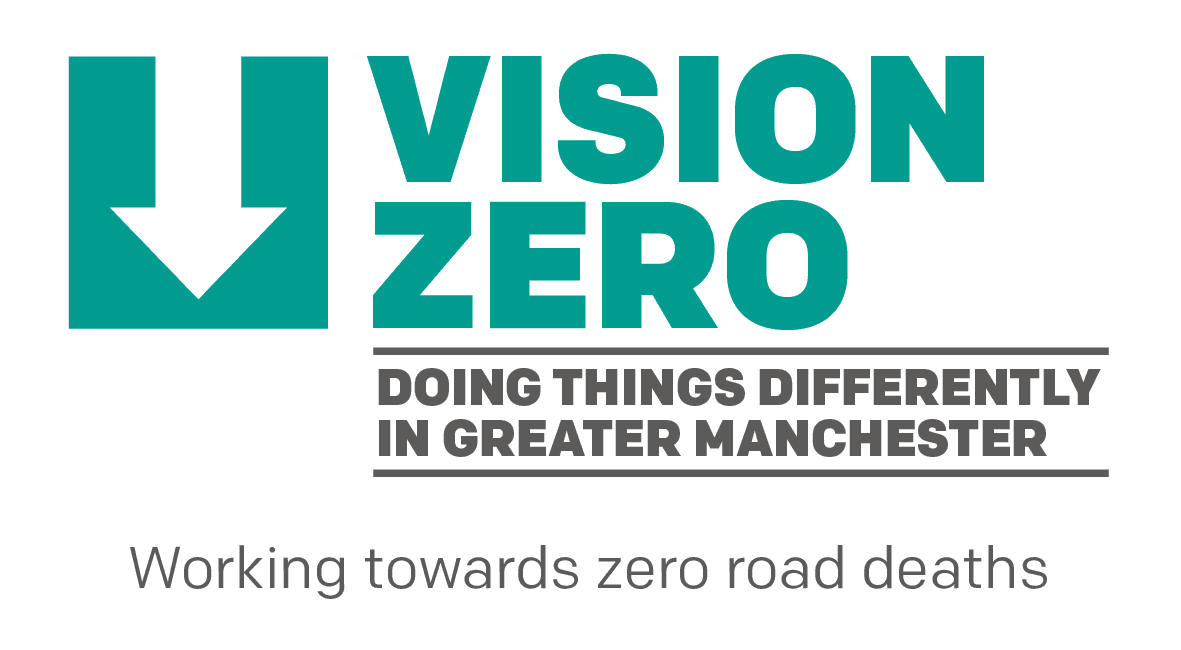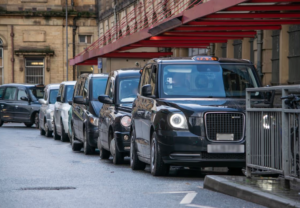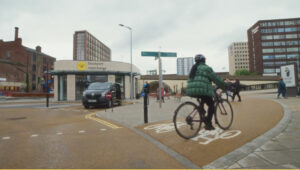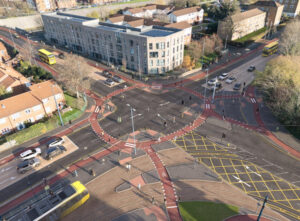Greater Manchester’s authority says its journey towards ending all road deaths and life changing injuries by 2040 has reached a major milestone, with a new Vision Zero Strategy and Action Plan for the city-region unanimously approved, with leaders from the 10 local authorities giving it their strong support.
First implemented in the 1990s and now adopted by countries and cities around the world, Vision Zero is a strategy to eliminate all traffic fatalities and life changing injuries, as well as supporting economic prosperity and inclusivity across the region.
In the last 10 years nearly 10,000 people who live in, work in or visit Greater Manchester have been killed or seriously injured on our roads. In 2022, 64 people lost their lives on our roads and a further 787 people were seriously injured.
The most recent figures released by the Department for Transport show that the number of casualties in Greater Manchester fell by 6.2% to 799 in 2023, including 45 deaths – a 29.7% decrease on the previous year.
Greater Manchester’s newly-adopted plan includes a set of measures to reduce this further, including an interim target to halve road traffic deaths and life changing injuries by the end of this decade. Although collisions between vehicles on the road may occur, deaths and life changing injuries can be prevented, and the Safe System aims to minimise the impact of a collision and can save lives.
The plan, backed by multiple agencies from across Greater Manchester, is squarely focused on saving lives. But it will also deliver added benefits to the city-region’s communities, including creating safer and more attractive streets, reducing collisions and congestion, and reducing the costs of collisions including that to emergency services and damage to property.
Kate Green, Greater Manchester’s Deputy Mayor for Stronger and Safer Communities, said: “Everyone is entitled to feel safe while using our roads, whether you’re driving, in the passenger seat, using public transport or active travel to get around.
“This is a powerful moment where all Greater Manchester’s leaders have come together behind a joint plan to take decisive action and make a change. We must remember that behind every headline about collisions on our roads are families that are either grieving or supporting victims whose lives have been changed forever.
“I want to say a huge thanks to Dame Sarah, who has spearheaded this important work to bring together all our emergency and public services behind a shared goal. Vision Zero not only adopts an ambitious target but will bet the driving force for increased safety on Greater Manchester’s roads.”
Cllr Eamonn O’Brien, Vice Chair of the Bee Network Committee and Leader of Bury Council, added: “Making our roads and streets safer is a top priority for residents when we speak to them. It’s why I am pleased to see this collective commitment to take such comprehensive action in response.
“By having such an ambitious target, we are making it clear that we want to accelerate the good progress we’ve made already in Greater Manchester and settled for nothing less than zero.”
Major interventions within the Action Plan include:
- A new Greater Manchester speed management policy by 2025 which will equip local authorities with the tools to review or change (subject to consultation) speed limits, to ensure they are at an appropriate level for specific areas, reflecting the mix of road users risk and purpose of the road which may evolve over time.
- Increasing targeted roads policing, such as speed enforcement and vehicle stops, where there is a high risk of incidents or is a known hotspot.
- Upgrading safety cameras (spot speed and average speed) across the region to ensure unsafe speeds are tackled effectively, supported by police enforcement.
- Lobbying for local highway authorities to be given extra powers to tackle illegal and inconsiderate parking at high-risk locations, such as outside schools, while providing support for these measures such as appropriate road marking and signage.
- Delivering campaigns targeting antisocial road user behaviour, while also educating road users on the biggest cause of injury collisions (the Fatal Four*) and how they can keep themselves and others safe on the roads.
- Removing dangerous vehicles from the road and continuing to target individuals who are not driving their vehicles legally, including off road bikes and illegally modified e-bikes, e-scooters and e-motorbikes.
- Ensuring people involved in road traffic collisions get the best possible care in the short and long term, while also continuing to invest in specialised incident training and undertaking thorough investigations when collisions do occur to prevent similar collisions in future.
While the recent fall in road deaths and life changing injuries is welcome, behind every figure there is a human being. Every death or life changing injury has immeasurable cost to family, friends and the wider community.
Alongside the devastating pain, grief and suffering which results from road traffic collisions, victims are often left unable to work or facing medical costs.
Reducing casualties and collisions will also alleviate cost and staffing pressure for emergency services. The Greater Manchester Fire and Rescue Service (GMFRS) now attends more road traffic collisions than fires. Greater Manchester Police attend on average around 925 road traffic collisions every month, with around 3,000 officers required to attend road traffic collisions each month.
The Greater Manchester Major Trauma Hospital, located on the Salford Royal Hospital site, is a partnership with Manchester University NHS Foundation Trust, North West Ambulance Service, North West Air Ambulance and the Greater Manchester Integrated Care Board.
The majority of major trauma patients from across Greater Manchester, including victims of road traffic collisions, are taken to the trauma hospital to ensure they get the prompt care that they require.
Across Greater Manchester in 2022/23, a total of 695 people were hospitalised after being involved in a road traffic collision. Around half of these patients were seriously injured, suffering severe head injuries and/or multiple fractures which may include limbs, chest and pelvis.
The average length of stay in an intensive care unit (ICU) for those seriously injured patients requiring life support – a ventilator to help them breathe – is four days.
Professor Martin Smith, Consultant in Emergency Medicine at Salford Royal, which is part of the Northern Care Alliance NHS Foundation Trust, said: “There have been far too many occasions where I have had to stand in front of a patient’s mum or dad and tell them that their son or daughter might not make it.
“I see patients with multiple, life changing injuries that are caused by road traffic collisions and many of them face months, if not years, of surgery and rehabilitation to try and regain some kind of normal life back. There is also a huge impact on a family coping with the death of a loved one and that is never easy to witness.
“Vision Zero has my full support; we have to do all we can to make our roads safer for one another and ensure we are not the ones standing in front of a doctor hearing traumatic news that means our life will never be the same again.”
Dame Sarah Storey, Active Travel Commissioner for Greater Manchester, said: “Bringing the conversation about Vision Zero to Greater Manchester was one of the first things I did after taking up the role of Active Travel Commissioner in 2022. Working on this strategy with all partners over the past two and a half years, it has been clear to see how motivated everyone is to reach a time when there are no deaths or serious injuries on our region’s roads.
“Today marks an important milestone in the adoption of Vision Zero, but it also signifies the start of a very focused strategy to deliver what is set out in the Action Plan. Everyone who lives in, works in or visits Greater Manchester has the right to be safe however they choose to travel, and I am very committed to supporting this collective effort.
“Greater Manchester is leading the way in so many aspects of our lives and now with Vision Zero adopted, we will be calling for more to be done nationally to ensure we deliver.”
The strategy and plan have been developed by the Safer Roads Greater Manchester Partnership, which brings together then 10 local authorities alongside Transport for Greater Manchester, the Greater Manchester Combined Authority, Greater Manchester Fire and Rescue Service, Greater Manchester Police, NHS and National Highways.
(Picture – TfGM)
























